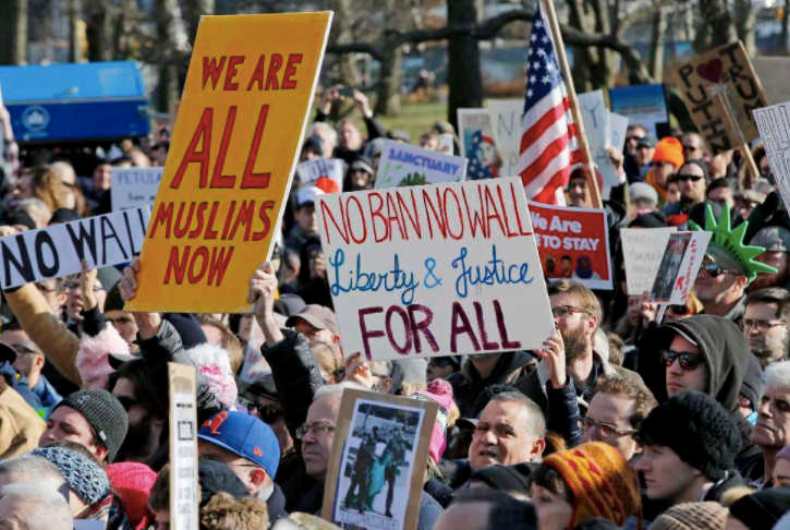 By no means was this going to be an easy year for the Middle East & North Africa (MENA) region. The economic challenges would have had been enough to keep everyone on their toes. Even as the region’s leaders were bracing for the impact of Brexit and the US General Elections, bad news, in the form of the US immigration ban, has hit sooner and harder than expected.
By no means was this going to be an easy year for the Middle East & North Africa (MENA) region. The economic challenges would have had been enough to keep everyone on their toes. Even as the region’s leaders were bracing for the impact of Brexit and the US General Elections, bad news, in the form of the US immigration ban, has hit sooner and harder than expected.
All those who thought that the promises that President Donald Trump made during the elections were rhetoric, are now left stumped. It has not even been a month since Trump has assumed office and the world watches in horror as an immigration ban on seven Muslim-majority nations from the region has come into effect. Neither of these countries have been named in any terror attack on the US soil since 9/11, and yet citizens of these countries are all under the scanner.
Since the executive orders were signed, news reports and social media is flooded with reports of people being prevented to board flights, citizens of the banned nations being stranded in transit despite clearing years-long process of entering US, refugees being stranded in third countries, and even Iraqis who worked with the US military being denied entry. Global media has challenged the ban, and then there are some who have supported it as well reasserting the divided world on this subject.
The tech industry has already voiced its concerns. Google, Facebook and other biggies have not only recalled employees but have made comments against the ban as well.
“We’re concerned about the impact of this order and any proposals that could impose restrictions on Googlers and their families, or that create barriers to bringing great talent to the US,” Google said in a statement.
The tech major’s co-founder Sergey Brin even showed up at the San Francisco international airport, interacting with people protesting against the order.
Google Co-Founder Sergey Brin at SFO protest: “I’m here because I’m a refugee.” (Photo from Matt Kang/Forbes) pic.twitter.com/GwhsSwDPLT
— Ryan Mac (@RMac18) January 29, 2017
In his LinkedIn post, Microsoft CEO, Satya Nadella wrote, “As an immigrant and as a CEO, I’ve both experienced and seen the positive impact that immigration has on our company, for the country, and for the world. We will continue to advocate on this important topic.”
Apple’s CEO, Tim Cook, also raised concerns in an internal email, saying, “I’ve heard from many of you who are deeply concerned about the executive order issued yesterday restricting immigration from seven Muslim-majority countries. I share your concerns. It is not a policy we support.”
The ban has left room for complain and with reason. Global media reports are questioning why the ban does not include other countries in the region, which if did happen, would be further disastrous for MENA.
For the marketing and advertising industry, apart from putting a limitation on talent, and raising doubts in the minds of the people who travel or shift job opportunities between markets, this ban will directly impact any global platform, including the likes of awards, conferences, talent exchanges, global solutions hubs and centers of excellence, where MENA has just about begun making its mark. Not only from the seven impacted markets but also because of the uncertainty towards the region itself.
For an economy that has been fighting its own internal challenges, the ban has added significantly more pressure. One of the biggest concerns is how this will impact Iran. The hopes that Iran would have bailed out markets in the region are already looking bleak. The ‘world’s last great untapped market’, as described by WPP’s Sir Martin Sorrell, might face a permanent ban, more so as Iran has retorted to the ban on their citizens with a ban on US citizens entering Iran.
For the rest of the region, the ban has created confusion, chaos and anger. Global investors will have to think twice, specifically in the case of Iran. Any investor who wants to maintain good relations with the United States will wait for at least six months before thinking of investing in the region, and may even opt to boycott totally – neither implying confidence in investing in the region.
Optimists may want to believe that the global protests and criticism from Americans alike will change the course of the ban, but much damage is already done. Markets in MENA will have to pay the price, in millions of dollars, of becoming an ‘anxious’ economy post this ban. The effects will trickle top down to the lowest order in the chain of both the economies and communities in the region.
The imminent troubles are evident. For the advertising community, for startups and tech players, Iran is an important market in 2017. While the ban will have an impact, it will not stop from players in the region to explore all their options. The steps forward will have to be less about what Trump plans to do next, and more about how the region deals with these challenges.
That being said, if there was one word to describe MENA and the various countries that are aspiring for growth in the region, it is resilient. It will not be a surprise for someone like me, when there will be reports a year down the line on how the region faced one of its biggest challenges, did not give up and kept growing stronger more than it ever did before Trump times.




